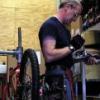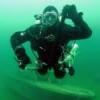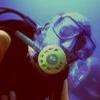
Oops, what just happened?
#1

Posted 27 February 2006 - 11:38 PM
I am seeing posts about blown o rings, HP hose issues, LP hose issues, bad computers, etc..........what do you do when these things happen? If I have a hose problem at 100 ft am I toast? How do you blow an o ring at depth? Can you fix any of these malfunctions yourself or is it time to surface and get new gear? How many of these problems can be avoided when doing your predive inspection?
beachbunny@singledivers.com
"Be the change you wish to see in the world"
Ghandi
#2

Posted 28 February 2006 - 12:06 AM
Reading the thread regarding your worst gear failures has got me thinking. I am a new diver and fortunately have never encountered a gear malfunction. My worst experience has been being underweighted at the end of the dive which can be easily remedied. Oh, and a mask that kept fogging over until I stopped rinsing all the defogger off.
I am seeing posts about blown o rings, HP hose issues, LP hose issues, bad computers, etc..........what do you do when these things happen? If I have a hose problem at 100 ft am I toast? How do you blow an o ring at depth? Can you fix any of these malfunctions yourself or is it time to surface and get new gear? How many of these problems can be avoided when doing your predive inspection?
Generally in recreational diving if you have a major gear malfunction - your dive is now over and it is time to surface.
I don't see any problems that you listed that you can fix underwater.
Most problems can be avoided by proper gear maintainence. Looking over your hoses to see they are intact and not bubbling -- making sure your o-rings are in good working order -- etc.
Sometimes Murphy strikes despite all your best intentions and hard work -- then you manage the situation -- end your dive and hope you have the right items in your backup on the boat (shore) to be able to fix it and make the next dive.
Pink ~~~ It's the New Black!!!
#3

Posted 28 February 2006 - 12:31 AM
#4

Posted 28 February 2006 - 07:36 AM
and why you (I) don't dive alonePutting in my un-expert opinion those problems are why you have a buddy with an octo.
#5

Posted 28 February 2006 - 07:58 AM
I would have to say there are 2 factors that impact how well you can handle any problem that arises at depth. Experience is the biggest one, but all so being familiar with your gear is a big factor.
The biggest factor in any emergency is not to PANIC. Controlling your breathing and keeping a clear head will get you through any emergency. The reason I say controlling your breathing is because if you are having an air problem, free flow reg or out of air or anything dealing with loss of air, if you begin to panic, you will use up what air you do have faster.
Also, dive within your limits. If you are going to challenge yourself, be confident that you can handle the challenge in a worst case situation. That way if you have a problem, it doesn't get compounded by lack of ability with the dive itself.
#6

Posted 28 February 2006 - 11:26 AM
Blown o-ring, time to surface and turn your tank valve off. Checking these things every time you assemble your gear helps to prevent this problem, but can not garuntee it won't happen. O-rings can be damaged anytime you connet or disconnect your gear.Reading the thread regarding your worst gear failures has got me thinking. I am a new diver and fortunately have never encountered a gear malfunction. My worst experience has been being underweighted at the end of the dive which can be easily remedied. Oh, and a mask that kept fogging over until I stopped rinsing all the defogger off.
I am seeing posts about blown o rings, HP hose issues, LP hose issues, bad computers, etc..........what do you do when these things happen? If I have a hose problem at 100 ft am I toast? How do you blow an o ring at depth? Can you fix any of these malfunctions yourself or is it time to surface and get new gear? How many of these problems can be avoided when doing your predive inspection?
Blown HP/LP hose, time to surface and turn your tank valve off. Look for kinks, damage or signs af wear at least every dive day and anytime you think you may have stressed the hose.
Computer failure, time to surface. That computer will allow you to get closer to your NDL limits than the tables will, so don't figure that you can continue the dive safely without it.
Keep your gear in top shape, your life depends on it. My best advice is to get used to your gear. Dive as much as you can with it. Then when you have mastered your gear, start doing drills with it (and a buddy near by). Learn to go from your primary to your octo and back. Reach back and turn your air valve off a turn and back on so you know you can do it. NEVER turn it all the way off unless you have a seperate air source in your mouth. And keep reading what other divers do, ask other divers when you are out diving. Almost every diver handles a failure a little differently. The only common action among all divers is that when gear fails, they pee in their wet suits.
Hope this helps
#7

Posted 28 February 2006 - 11:35 AM
Actually, that's why you carry a Spare Air or pony bottle with the latter being preferable. I've read that tatistics show that in most cases of multiple diver deaths, one diver was sharing his/her air with the other and both then ran out.Putting in my un-expert opinion those problems are why you have a buddy with an octo.
#8

Posted 28 February 2006 - 11:38 AM
Computer failure, time to surface.
Just to make sure that nobody thinks your suggestions mean to swim straight up, I would not recommend coming straight to the surface in the event of a computer failure or most other situations.
For example, with a computer failure, first, I would suggest carrying a backup depth gauge and time along with a dive plan on a slate. Switch to Plan B if your computer fails, terminating the dive per the plan.
Second, I would suggest making a safety or decompression stop after all diving over about 20 feet or so.
Third, the procedure would depend on your computer's instructions and those of your training if such an event were to happen. For example, some suggest going to 15 feet, stopping, and using all of your remaining gas (other than the last saftey margin gas) before surfacing--if conditions permit. This assumes that your computer fails at depth, and you do not know your current decompression obligation. (How you got here is the subject of another talk to be had once you have survived this dive.)
Most other things that are important equipment failures should result in a dive termination, which would then call for carrying out all required stops and safety stops. Gas share if that is warranted. However, it is not required to swim straight to the surface in many instances.
Don't wait for things like this to happen. Prepare for when they do, and you will be ready for them.
"For the diligent diver, closed circuit rebreathers are actually safer than open circuit scuba." Tom Mount
#9

Posted 28 February 2006 - 12:18 PM
Blown o-ring, time to surface and turn your tank valve off. Checking these things every time you assemble your gear helps to prevent this problem, but can not garuntee it won't happen. O-rings can be damaged anytime you connet or disconnect your gear.Reading the thread regarding your worst gear failures has got me thinking. I am a new diver and fortunately have never encountered a gear malfunction. My worst experience has been being underweighted at the end of the dive which can be easily remedied. Oh, and a mask that kept fogging over until I stopped rinsing all the defogger off.
I am seeing posts about blown o rings, HP hose issues, LP hose issues, bad computers, etc..........what do you do when these things happen? If I have a hose problem at 100 ft am I toast? How do you blow an o ring at depth? Can you fix any of these malfunctions yourself or is it time to surface and get new gear? How many of these problems can be avoided when doing your predive inspection?
Blown HP/LP hose, time to surface and turn your tank valve off. Look for kinks, damage or signs af wear at least every dive day and anytime you think you may have stressed the hose.
Computer failure, time to surface. That computer will allow you to get closer to your NDL limits than the tables will, so don't figure that you can continue the dive safely without it.
Keep your gear in top shape, your life depends on it. My best advice is to get used to your gear. Dive as much as you can with it. Then when you have mastered your gear, start doing drills with it (and a buddy near by). Learn to go from your primary to your octo and back. Reach back and turn your air valve off a turn and back on so you know you can do it. NEVER turn it all the way off unless you have a seperate air source in your mouth. And keep reading what other divers do, ask other divers when you are out diving. Almost every diver handles a failure a little differently. The only common action among all divers is that when gear fails, they pee in their wet suits.
Hope this helps
You're from Michigan? We don't use many wetsuits up here so there is no peeing in it, LOL.
Actually, the blown tank O-ring and LP hose shear are my largest concerns in a single tank, NDL dive as I typically don't a buddy that I trust real well. That isn't to say that I wouldn't make it, but it would not be a fun ascent. I can also reach back and feather the tank valve if need be. The Tank, O-Ring failure that you refer to is possible but rare. Hopefully, my buddy will be there to get me some air.
Computer failure? I have had it happen. I dive a bottom timer/computer and a primary computer for that reason. Or I thumb the dive and follow my buddy's computer up to the deep stop and treat my buddy's computer like a bottom timer. No big deal.
Oh, and in Advanced Nitrox, the drill is to breathe the reg dry before inserting the back-up so that you know how a OOG feels. You should have the back-up under your chin or in your had though
#10

Posted 28 February 2006 - 12:28 PM
Actually, that's why you carry a Spare Air or pony bottle with the latter being preferable. I've read that tatistics show that in most cases of multiple diver deaths, one diver was sharing his/her air with the other and both then ran out.Putting in my un-expert opinion those problems are why you have a buddy with an octo.
I'll take a well planned dive and a good dive team over a pony any day of the week. As for the statistics of multiple diver deaths where both divers ran out of gas... not surprising. Recreational diving seems to be built around the idea of extracting the final breaths out of a tank. Rather than leaving proper safety margins for emergencies.
I have yet to see a recreational dive class broach the subject of turn pressures, and safety margins. Probably because the dive length would be SO short for a single 80, no one would bother. Case in point:
1. AL80 at 3000psi.
2. Reserve 500psi for emergencies.
3. Dive Rule of thirds giving you 1/3 for the swim out, 1/3 for the swim back. Final third belongs to buddy.
The math: 3000psi - 500psi =2500psi. 2500psi /3 = 833psi
How many recreational divers would plan a 60-100ft dive with only 833psi to burn? How many would feel cheated coming back on the boat with 833psi+500psi=1333psi still in the tank? Especially if they were paying for Nitrox.
#11

Posted 28 February 2006 - 12:52 PM
Generally in recreational diving if you have a major gear malfunction - your dive is now over and it is time to surface.
I don't see any problems that you listed that you can fix underwater.
Most problems can be avoided by proper gear maintainence. Looking over your hoses to see they are intact and not bubbling -- making sure your o-rings are in good working order -- etc.
Sometimes Murphy strikes despite all your best intentions and hard work -- then you manage the situation -- end your dive and hope you have the right items in your backup on the boat (shore) to be able to fix it and make the next dive.
Yep... dive over in most cases. Be sure to check the obvious. It's possible a loose hose may allow a leak at the connection and can be sufficiently tightened under water to solve the problem for the dive. You can check the connection at your second, but a buddy would have to help behind your head at the first. If your reg is integrated into your bcd (crap)
A hose leaking is probably not the end of the world. Some time open a tank all the way and see how long it takes to empty. (close the valve immediately when the pressure gets so low you can tell it is about empty to prevent moisture from being sucked back into the now "cold" cylinder"). You will find you have adequate time to end the dive and surface normally in most cases unless this happens at the end of your dive, although you should be alot closer to the surface in that case. Either way, your buddy should be with you to insure you have air if you run out. Rarely will a hose catastrophically fail immediately, rather will usually leak an increasingly larger stream of bubbles over time giving you warning to replace it. A completely catastrophic failure would likely only occur at the surface as a result of damage to the hose from a fall or similar occurance.
I've had a bcd LPI become completely disconnected from my BCD, and it was not fixable in water. Drop weight or you're going to have to kick real hard to surface.... I was fortunate to have another very accomplised diver with me and we were able to surface "together".
Lot's of other examples, but most problems like blown o-rings RARELY occur. Be sure to maintain your gear and replace what is too worn to be useable. Tight fittings prevent most o-ring problems, assuming you have your gear serviced regularly by a reputable tech. Rental gear is more suspect, so buy your own gear and maintain control over it. If you loan out your gear, you may consider having them pay you up front for equipment service to be done upon its return. I've seen so much gear come to me for repair when the last person to use it was not the owner of the gear... but someone that "borrowed" it.
Out of time now... more later
Actually, the WORST day of diving is better than the BEST day at work...
and... my life is not measured by the number of breaths I take, but by the number of breaths I take UNDER WATER
"I see you are no stranger to pain." -- "I was married... TWICE!!!" HOT SHOTS, PART DEUX
#12

Posted 28 February 2006 - 05:05 PM
A pony bottle I agree with, and I carry one. But I view carrying Spare Air the same as a spy carrying a cyonide pill.Actually, that's why you carry a Spare Air or pony bottle with the latter being preferable. I've read that tatistics show that in most cases of multiple diver deaths, one diver was sharing his/her air with the other and both then ran out.
I guess I did leave it open ended a bit [whine=on] But someone else used the same term and didn't get picked on[whine=off]Computer failure, time to surface.
Just to make sure that nobody thinks your suggestions mean to swim straight up, I would not recommend coming straight to the surface in the event of a computer failure or most other situations.
For example, with a computer failure, first, I would suggest carrying a backup depth gauge and time along with a dive plan on a slate. Switch to Plan B if your computer fails, terminating the dive per the plan.
To me, the term "time to surface" means going to the surface safely. That includes the safety stop if you have the air. Maybe I just have it too ingrained into my diving, that I assume that everyone does a safety stop. My bust. As for the 15' safety stop, the only time I don't do one is when I have been diving at a shallower depth. I won't descend to do a safety stop, it just ain't natureal.
As for ending the dive with a backup or a buddy's computer, as long as you mean end it now, I agree. But if you are talking about finishing a planned, 30 minute dive when the computer fails 10 minutes into the dive, I have to disagree. Experianced Tech divers may be able to do it. But then they tend to be much more aware about gas supply and deco obligations at ANY point in the dive as compared to "Recreational" divers.
Let's say I'm on my 5th dive to 80' that day and my 500AI goes blank as soon as I hit 80. My buddy, on the other hand, is on his or her 1st dive of the day. I will already be loaded with nitrogen as they will be in good shape. If I follow their computer, I will without doubt, pass my NDL, and run a much higher risk of DCS. And to try and finish the aforementioned dive on tables, no way. According to the tables, by my 5th dive to 80', I'm dead. No. I am afraid that I must err on the side of safety and say if your computer fails, end the dive and head for the surface.
My 2¢
#13

Posted 28 February 2006 - 06:09 PM
Don't get me wrong, the 15' deco stop is ALWAYS a great idea to keep yourself safe and happy, 'specially so for those of us that aren't trained for deco. The last thing I want on a vacation is a 1 to 4 day ride in a chamber, as it spoils the party (I hope you brought some good books....)
#14

Posted 28 February 2006 - 07:35 PM
Great response Kimber!Generally in recreational diving if you have a major gear malfunction - your dive is now over and it is time to surface.
I don't see any problems that you listed that you can fix underwater.
Most problems can be avoided by proper gear maintainence. Looking over your hoses to see they are intact and not bubbling -- making sure your o-rings are in good working order -- etc.
Sometimes Murphy strikes despite all your best intentions and hard work -- then you manage the situation -- end your dive and hope you have the right items in your backup on the boat (shore) to be able to fix it and make the next dive.
Once in a while, it is good to step back, take a breath, and remember to be humble. You'll never know it all - ScubaDadMiami. If you aren't afraid of dying, there is nothing you can't achieve - Lao-tzu. One dog barks at something, the rest bark at him - Chinese Proverb.
#15

Posted 01 March 2006 - 12:25 AM
I am not a technical diver, don't play one on TV. I am a purely recreational diver, and a new one at that. That said, I do have an interest in technical diving, and have learned a little about technical diving. My primary point was simply that recreational divers that I have been exposed to, don't do gas planning well, and this can lead to problems in an emergency.
I also disagree with the idea the the primary difference between tec and rec divers is the "overhead" preventing a direct return to the surface. From what I can glean, the primary difference between the two camps is how safety is approached, and how dives are planned. To put it succinty, the difference is mindset, rather than gear, or environment.
You folks keep talking about deco limits and obligations like they're a normal part of a 'recreational' dive. Ain't so, most of the time. The *only* dives I've done where I hit the N2 limit before I hit my turn point on gas was in NC, where the average depth was 90 to 115'. For most of us rec divers, that's a rarity, not the norm. That's the major difference between tec and rec divers: no 'overhead' keeping us from a direct return topside if it all goes wrong. We're *allowed* to do additional stops on deep dives, but we aren't *trained* for 'em, yet.
Don't get me wrong, the 15' deco stop is ALWAYS a great idea to keep yourself safe and happy, 'specially so for those of us that aren't trained for deco. The last thing I want on a vacation is a 1 to 4 day ride in a chamber, as it spoils the party (I hope you brought some good books....)
0 user(s) are reading this topic
0 members, 0 guests, 0 anonymous users






















